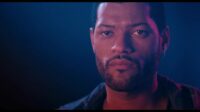If I were to sum up The House of Gucci, I’d call it not great, but not terrible. However, it is fun to watch. Except it’s for all the wrong reasons. I can’t shake off bad accents when I hear them. What really takes me out of a movie is when silly accents are vocalized in a country that doesn’t speak English. Just a month ago, I saw a different Ridley Scott film that tackled this obstacle well. Why didn’t he do that again here?
Once I had finally got over that minor detail, I saw a conventional rise and fall story with memorable characters. House of Gucci is best regarded as comedy. Ridley Scott views the Gucci’s as buffoons. Everyone chews up the scenery like they’re in a stage play and nobody sounds remotely Italian, but maybe that’s the intent, to show what a joke the greedy people of the world are.
The story starts with Maurizio Gucci (Adam Driver) being heavily flirted on by Patrizia Reggiani (Lady Gaga). Patrizia follows Maurizio around to the extent where you wonder if her feelings for him are real or if she’s after his wallet. Maurizio comes from a name synonymous with the rich. His father, Rudolfo (Jeremy Irons), is aware of Patrizia’s true intentions. She wants the Gucci money for herself. Despite his warnings, Maurizio weds Patrizia. From that moment on, Patrizia tears the Gucci family apart from one by one.
Lady Gaga sounds like she’s from Russia. When her narration first kicks in, I thought to myself, “Is that really how she’s going to sound?” Every character is larger than life in House of Gucci: Patrizia Reggiani is a cutthroat manipulative businesswoman who came from nothing. Rodolfo Gucci is the cold father who could manipulate anyone with his class. Daddy’s psychological effects impacted his son Maurizio to some degree. Maurizio, like his father, is impersonal, the total opposite of his uncle Aldo (Al Pacino) the life of the party and of Aldo’s son Paolo (Jared Leto) who’s the classic man-child screw-up. Jared Leto is overacting through his makeup to the point where he’s doing sound effects more than dialogue. His character is monumentally helpless and the more pathetic Leto acted, the more I disliked him, but I also felt a little sorry for his character. He’s a fool, but he can’t help that he’s one.
Paolo’s father, Aldo, is the one keeping the family and business together. The exuberance Pacino puts out makes the little ball of energy a sight to behold. Adam Driver though is oddly out of place since his character Maurizio is intentionally the polar opposite of Gaga’s flamboyant Patrizia. His calm demeanor makes his lack of a proper dialect all the more painful to listen to. Unlike Ms. Gaga, Mr. Leto, or Mr Pacino, Mr. Driver doesn’t have any larger than life presence to make his goofiness fit the comedic atmosphere Ridley Scott has set up.
In the most traditional sense, House of Gucci is a classic Hollywood star-driven thriller. As someone who knows nothing about the Gucci family, I’m certainly glad I avoided the ads (as you should too). The plot would come close to playing out like a Lifetime special if not for Ridley Scott’s stellar as always production values. House of Gucci could easily be sneezed at as a direct to video parody if it weren’t for Mr. Scott’s gifted attention to detail. Cinematographer Dariusz Wolski films a very colorful image with the vibrance muted. There’s excess everywhere from the marble on the walls, to the loud clothing. But the color is desaturated in post production. Everything is coded in blue taking away the glamour from the Gucci name. With the color reduced the movie can focus on the frailty of the characters’ petty squabbles. Although I loved the way it looks, House of Gucci feels like it was rushed through the door.
I’m afraid it’s possible that Ridley Scott is just making too many movies at the same time. Not everyone can be Steven Spielberg, directing Schindlers List and Jurassic Park within the same year. I’m sure Mr. Spielberg cared for Jurassic Park but his true passion was in Schindler’s List. Ridley Scott cares about every film he makes as any other director, but his heart just doesn’t seem to be as much in this one as it was in The Last Duel. Unable to juggle so many projects simultaneously, Mr. Scott relies on his eyes more than his ears with The House of Gucci.
If you think the trailers have everyone looking out of place, wait until you see the final film. You may be bored or interested or amused like me. Beyond my amusement, I enjoyed the film’s pathos between selfishness and desire. House of Gucci appeals to Mr. Scott’s cynicism. He points his fingers at the bad guys. In this case, it’s the Gucci’s, but we see how the bad guys become harmful to themselves. The tale of the downfall is a classic one since it’s one that’s been utilized from Citizen Kane to Revenge of The Sith. Gucci’s downfall is a clown show that should be viewed in Mr. Scott’s eyes as a lesson for everyone. Don’t turn your back on family, or you’ll turn your back on your soul. How effectively that message land is a bit of a stumble, but I didn’t see House of Gucci as a dud.




